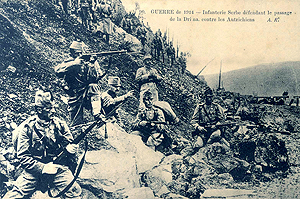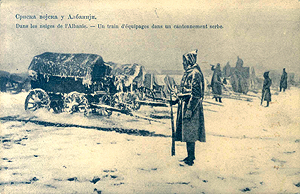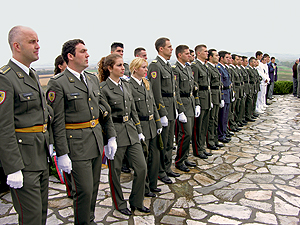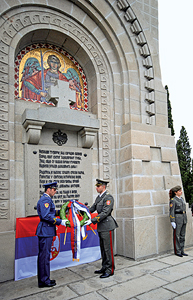Freedom
90 YEARS AFTER THE BREAK-THROUGH OF THE SALONIKA FRONT AND LIBERATION OF SERBIA IN WORLD WAR I
The Power of Final Victories
It cannot be explained by logics, mathematics, military sciences and skills. It was a superhuman accomplishment. In 45 days (as it will turn out) a small army destroyed three empires, several kingdoms, and passed over 1.500 kilometers under heavy battles. Only in this ”final offensive”, more than 10.000 Serbian warriors lay down their lives. ”Task accomplished, homeland is free!”
By: Dr Petar Opačić
 The breakthrough of the Salonika front in September 1918, in which the Serbian army had a crucial role, made the breakdown of the Central Powers appear suddenly in the horizon, as well as the victory of the Triple Entente and their allies in World War I. Both coalitions in war treated the front in Macedonia as a marginal battlefield, where operations in high style cannot be performed. Due to this reason and the long-term consequences which had a reflection on the further developments and outcome of the four-year long bloody world war, the breakdown of the enemy front in Macedonia echoed as a first-class sensation. The breakthrough of the Salonika front in September 1918, in which the Serbian army had a crucial role, made the breakdown of the Central Powers appear suddenly in the horizon, as well as the victory of the Triple Entente and their allies in World War I. Both coalitions in war treated the front in Macedonia as a marginal battlefield, where operations in high style cannot be performed. Due to this reason and the long-term consequences which had a reflection on the further developments and outcome of the four-year long bloody world war, the breakdown of the enemy front in Macedonia echoed as a first-class sensation.
The credit and glory for that success belong to the Serbian army. Thanks to the diplomatic support of France and its troops in the Salonika front, the Serbian army managed to, in only three days, from September 15 to 18, break through the main Bulgarian and German positions in the area of borderline Moglen mountains, on the Veternik – Dobro Polje – Soko – Crna Reka line. Already on September 21, in the expansive pursuit of the scattered enemy divisions, the Serbian army arrived to the Vardar river between Demir Kapija and Gradsko, then to the Babuna mountain, thereby breaking through the enemy front about 40 km in depth and 50 in width. Gradsko, a town where the centers of connections and supply for the whole enemy front flowed into, was taken over.
During all this time, the allied forces left and right from the Serbian formations –French, British and Greek – were still in their starting positions. In order to enable a full success of the brilliantly performed breakthrough of the front in the direction of the Serbian armies, the Serbian Supreme Command (regent Aleksandar Karadjordjević and Duke Živojin Mišić) decided on September 23, regardless of insufficient activity of the allied forces, to energetically continue the operations towards the Bulgarian border, in order to avoid dangerous consequences of potential side strikes of the enemy armies. As the British Prime Minister Lloyd George very accurately concluded in his memoirs, it initiated the allied armies left and right from the Serbian armies to begin rushing forward. When the Serbian Second Army arrived to the Bulgarian border near Carevo Selo on September 29, 1918, ready to move towards Sofia, the Bulgarian government decided to seek truce and signed the capitulation act.
UNEXPECTED KEY TO THE WAR
 At the time, the German army strongly held its positions in France and Belgium, on the Antwerp – Mesa line, the Austro-Hungarian forces held positions in Piava in middle Italy, while together, they held under occupation vast territories in Ukraine and Russia. After the capitulation of Bulgaria, however, an important pillar of the Central Powers was broken at the despised and underrated Balkan battlefield. With this, according to the conclusion of the German 11th Army headquarters commander General Dr Peter Kirch, the Serbs made a crucial penetration into the fortress of the German Reich. Up to that moment, the military strategists of both coalitions thought that the war would last at least one more year. When, mainly under the strikes of the Serbian army, Bulgaria signed capitulation, the German Supreme Command concluded that the war is lost for Germany and its allies and asked its Government to address the governments of the Triple Entente and USA and ask for concluding peace. At the same time, the French parliament adopted the Resolution stating that the Balkan battlefield became the main combat zone on September 30, 1918 and that, due to this fact, the Balkans will resolve the outcome of the war. At the time, the German army strongly held its positions in France and Belgium, on the Antwerp – Mesa line, the Austro-Hungarian forces held positions in Piava in middle Italy, while together, they held under occupation vast territories in Ukraine and Russia. After the capitulation of Bulgaria, however, an important pillar of the Central Powers was broken at the despised and underrated Balkan battlefield. With this, according to the conclusion of the German 11th Army headquarters commander General Dr Peter Kirch, the Serbs made a crucial penetration into the fortress of the German Reich. Up to that moment, the military strategists of both coalitions thought that the war would last at least one more year. When, mainly under the strikes of the Serbian army, Bulgaria signed capitulation, the German Supreme Command concluded that the war is lost for Germany and its allies and asked its Government to address the governments of the Triple Entente and USA and ask for concluding peace. At the same time, the French parliament adopted the Resolution stating that the Balkan battlefield became the main combat zone on September 30, 1918 and that, due to this fact, the Balkans will resolve the outcome of the war.
The governments of the Triple Entente made additional efforts to politically exploit the new situation in the Balkans, in order to materialize their imperial dreams. Great Britain, who most energetically opposed to undertaking offensive operations in the Balkans, sent four additional divisions and directed them towards Turkey for the purpose of taking over Constantinople and the Sea of Marmara strait. Italy added another division to its corpus in Albania, naming it the Army Group, with General Piaccenti in command. The aim was to enter Montenegro before the Serbian army and prevent the uniting of Montenegro and Serbia, in order to take over the eastern shore of the Adriatic Sea and disturb the forming of a joint Yugoslav state around Serbia. France engaged a major part of its forces in Macedonia for forming the Danube Army, with an assignment to cross over the defeated Bulgaria and the Danube, to enter Romania, renew its army and prepare a base for intervening against Russia.
Among all the allied forces in the Balkans, the Serbian army – operating together with the French detachment of General Tranier and two divisions which advanced by railway over Ćustendil and Pirot towards Zaječar, Negotin and Kladovo – was the only army which continued its operations towards the north, towards the Danube, the Sava and the Drina, in order to destroy the enemy forces in Serbia and liberate its still unliberated brothers.
THE FIRST AND LAST ”TRUCE”
 In the first half of October 1918, the First Army of Duke Petar Bojović had a major role in the operations of the Serbian forces in the north. The Second Army of Duke Stepa Stepanović, however, following the decision of the main allied commander General Franchet d’Esperey, was withheld on the Bulgarian border as a warranty that Bulgaria will fulfill its obligations from the Salonika Treaty. Then it was sent to liberate Kosovo and Metohija, to leave the Yugoslav division there, send one regiment (”Adriatic Troops”) to Montenegro to chase out the Austro-Hungarian troops retreating from Albania, and then, with the majority of its troops, advance down the Western Morava valley towards Bosnia. In the first half of October 1918, the First Army of Duke Petar Bojović had a major role in the operations of the Serbian forces in the north. The Second Army of Duke Stepa Stepanović, however, following the decision of the main allied commander General Franchet d’Esperey, was withheld on the Bulgarian border as a warranty that Bulgaria will fulfill its obligations from the Salonika Treaty. Then it was sent to liberate Kosovo and Metohija, to leave the Yugoslav division there, send one regiment (”Adriatic Troops”) to Montenegro to chase out the Austro-Hungarian troops retreating from Albania, and then, with the majority of its troops, advance down the Western Morava valley towards Bosnia.
In its advancing towards the Danube, the First Army shattered all the Austro-Hungarian and German forces in the Southern Morava valley in only ten days and arrived near Niš. The Germans formed a new front line there, with forces significantly overpowering the First Serbian Army. General d’Esperey sent the famous dispatch to Duke Mišić asking him to stop the First Army before Niš and wait until the other allied forces arrive, emphasizing that ”this army is rushing into an adventure”. Duke Mišić forwarded the dispatch of the Commander in Chief to Duke Bojović, letting him make his own decision on how to proceed. The First Army of Duke Bojović continued fighting and defeated the significantly more powerful German forces near Niš in a two-day battle, liberated the city on October 12, and continued to mercilessly pursuit the German and Austro-Hungarian forces towards the Danube. The advancement of the Serbian armies towards the borderline rivers caused the internal breakdown of the Austro-Hungarian Monarchy and the retreat of the German forces from Serbia.
 Although Turkey, Austro-Hungary and Germany capitulated in the meantime, the war was not yet over. The new Hungarian government of Mihal Karoli proclaimed secession from Austria and the independent Hungarian state, wishing to preserve under its authority (and hoping for understanding from the Western allies) all lands of St. Stephen’s crown, including, of course, Serbian Vojvodina. Karoli’s ambitions were ruined since general d’Esperey discarded his requests with indignation. In the meantime, the Serbian troops arrived to the Lipa–Arad–Szeged–Subotica–Baja line and further to the west, so the Hungarian government delegation, led by Linder, Minister of War in the new government, had to sign a treaty in Belgrade, dictated to it by Duke Živojin Mišić and French General Paul Henry on November 13, 1918. Although Turkey, Austro-Hungary and Germany capitulated in the meantime, the war was not yet over. The new Hungarian government of Mihal Karoli proclaimed secession from Austria and the independent Hungarian state, wishing to preserve under its authority (and hoping for understanding from the Western allies) all lands of St. Stephen’s crown, including, of course, Serbian Vojvodina. Karoli’s ambitions were ruined since general d’Esperey discarded his requests with indignation. In the meantime, the Serbian troops arrived to the Lipa–Arad–Szeged–Subotica–Baja line and further to the west, so the Hungarian government delegation, led by Linder, Minister of War in the new government, had to sign a treaty in Belgrade, dictated to it by Duke Živojin Mišić and French General Paul Henry on November 13, 1918.
That is how the first (Salonika) and last (Belgrade) treaty at the end of World War I were directly forced by the Serbian army. However, as Constantine Fotiades concluded at the anniversary of the end of World War I, the vain and arrogant generals of great allied armies never even mentioned the contribution of the Serbs who forced the end of the war with their courage and saved humanity from at least one more year of suffering (as the strategists of both coalitions predicted).
Let us conclude: enormous military resources were used in World War I in all fronts. New cannons, tanks, airplanes, war ships… They caused massive destructions and human victims. However, it is important to say, the crucial factor in the victory was the man – soldier filled with deep faith of the righteousness of his fight for freedom. Courageous, satisfied even with the minimum of life necessities, infinitely faithful to his country and his people, inspired by the St. Sava’s faith in God, that soldier had only one idea in his thoughts and heart: the fight for liberating his enslaved homeland. Such were Serbian soldiers for whom even the Commander in Chief of the German Army Headquarters admitted that they were among the best soldiers World War I has seen.
***
Capitulations
Cut off from its main allies after the stormy Serbian breakthrough, Turkey capitulated on October 30, 1918. It signed the act on surrendering with the British delegation in Mudros, at the Aegean island of Lemnos. The delegation of Austro-Hungary signed the act on surrendering near Padova, in the Italian Supreme Command headquarters, authorized by the allied governments and army headquarters.
Left without any allies, Germany signed an official act on surrendering in the French Supreme Command headquarters, in the famous wagon near Paris, on November 11, 1918.
***
Belgrade
It was exactly 10 a.m., November 1, 1918, when the commander of the First Serbian Army Duke Petar Bojović, leading the Danube Division, entered the capital city of Belgrade.
The explosion of indescribable excitement was preceded with the deepest silence in the world.
Silence solemn and devotional.
Silence of piety and pride.
Silence in which everyone could only hear his own heart.
Exactly 90 years ago!
|
